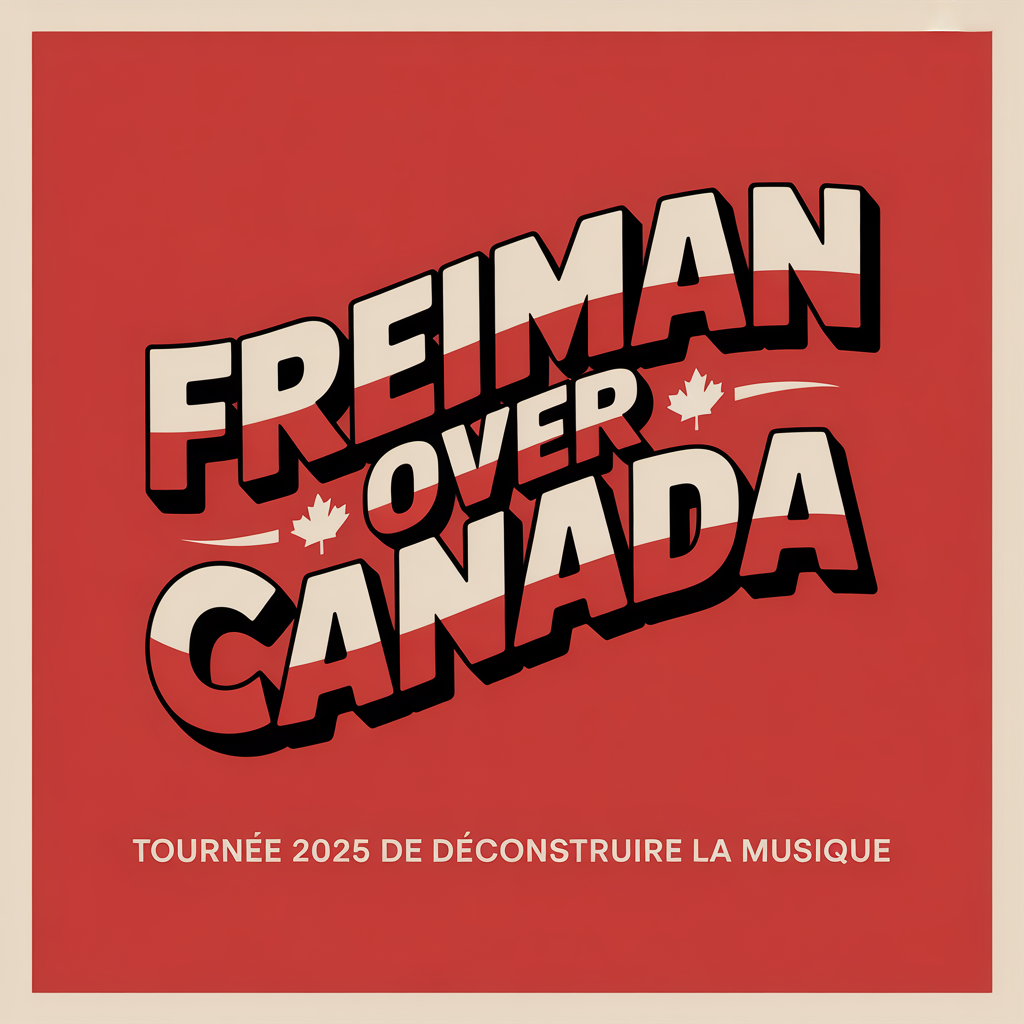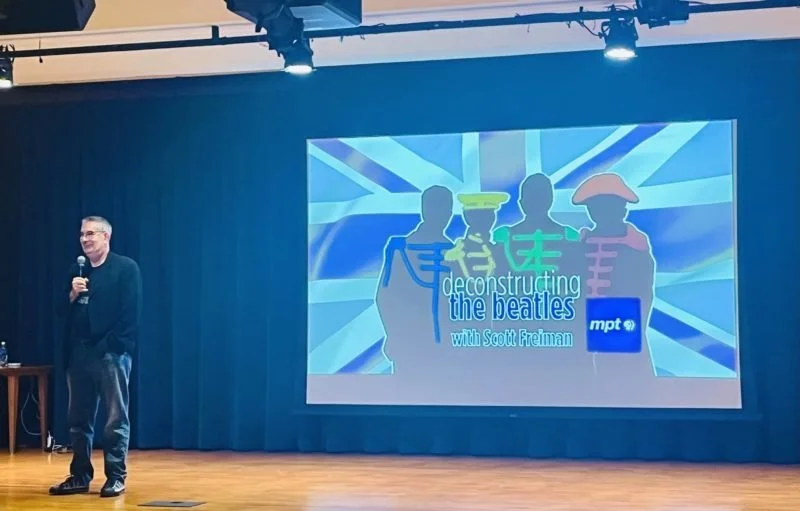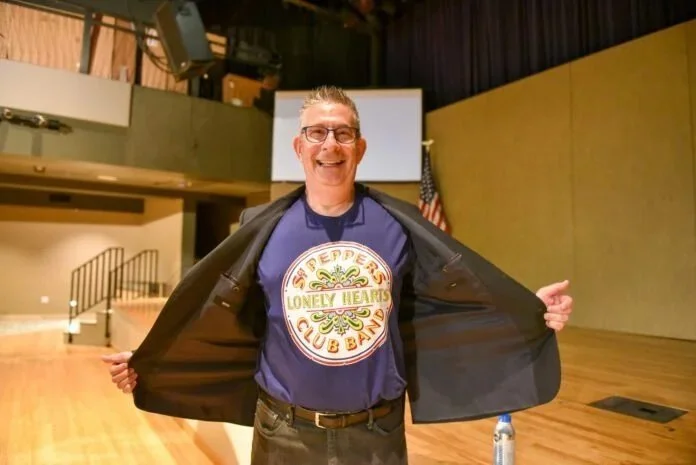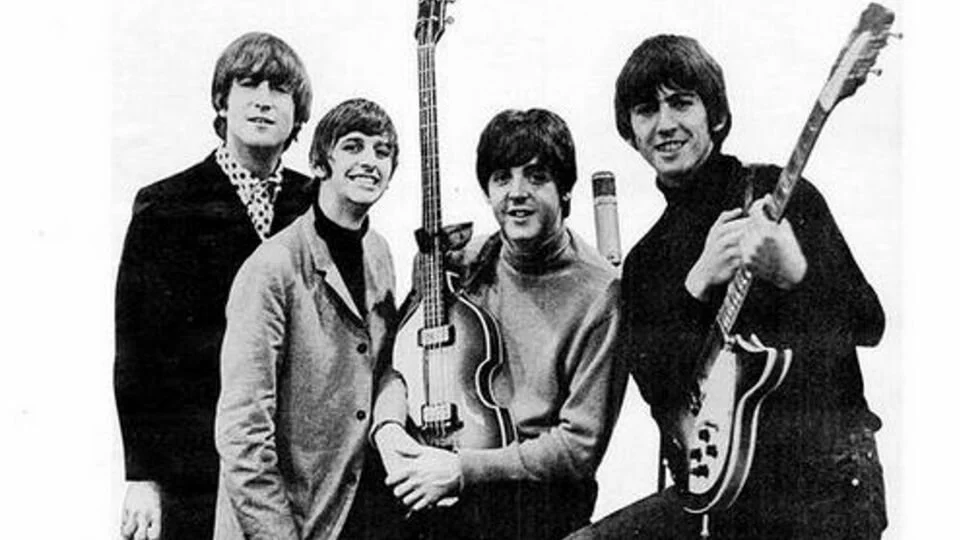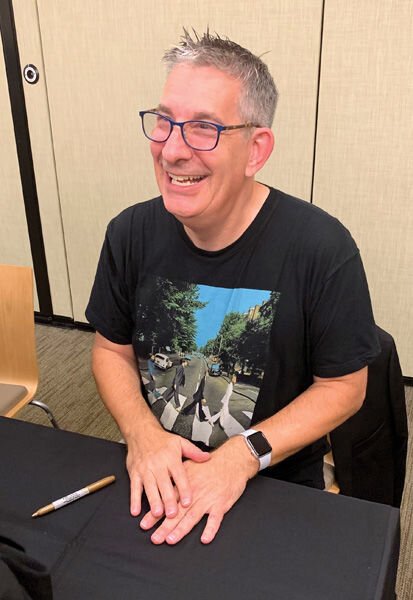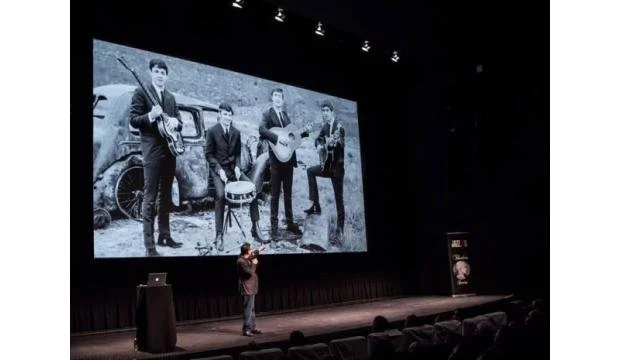PBS Host Scott Freiman Embarks on “Freiman Over Canada” — Driving Across the Country Deconstructing Iconic Beatles and Pink Floyd Albums
From Vancouver to Nova Scotia, composer and musicologist Scott Freiman—host of the acclaimed PBS series Deconstructing the Beatles—will be driving across Canada to present a trio of captivating multimedia lectures that dive deep into three of the most iconic albums in rock history.
FOR IMMEDIATE RELEASE
Contact: Scott Freiman
Email: scott@deconstructingthemusic.com
Website: www.deconstructingthemusic.com
PBS Host Scott Freiman Embarks on “Freiman Over Canada” —
Driving Across the Country Deconstructing Iconic Beatles and Pink Floyd Albums
August 21–October 1, 2025 — From Vancouver to Nova Scotia, composer and musicologist Scott Freiman—host of the acclaimed PBS series Deconstructing the Beatles—will be driving across Canada to present a trio of captivating multimedia lectures that dive deep into three of the most iconic albums in rock history.
Titled Freiman Over Canada (Tournée 2025 de Déconstruire la Musique), the tour will bring Freiman’s celebrated presentations to audiences in theaters from coast to coast: Deconstructing Rubber Soul, a 60th anniversary celebration of the Beatles’ transitional 1965 album that helped redefine pop music; Deconstructing Abbey Road, an in-depth exploration of the band’s final masterpiece and its iconic side-two medley; and Deconstructing The Dark Side of the Moon, a track-by-track analysis of Pink Floyd’s groundbreaking concept album on time, madness, and the human condition.
“I’m thrilled to bring my Deconstructing the Music lectures to audiences across this amazing country while exploring the landscapes, culture, and spirit that make Canada so unique,” says Freiman.
Tour stops include:
Roxy Theatre, Saskatoon, SK – August 27 & 28
Rio Theatre, Vancouver, BC – September 1
Fox Theatre, Toronto, ON – September 18
ByTowne Cinema, Ottawa, ON – September 19
King’s Theatre, Annapolis Royal, NS – September 26
Chester Playhouse, Chester, NS – September 27
Astor Theatre, Liverpool, NS – September 28
Additional dates to be announced.
Each show is a deep dive into the songwriting, production, and creative stories behind the music. Using rare audio, video, and behind-the-scenes insights, Freiman brings audiences into the studios where these legendary albums came to life.
"Annapolis Royal is full of lifelong Beatles fans, so we're very excited to have Scott Freiman come to King’s Theatre with his Deconstructing Abbey Road show. It's a fascinating journey through one of the greatest albums ever made, and I know our audience will leave with a whole new appreciation for the music.”
Freiman is the creator of Deconstructing the Music, host of the PBS television series Deconstructing the Beatles, and is featured in eleven Deconstructing the Beatles films. His lectures have been presented to sold-out audiences across North America. He taught a semester-long course on the Beatles at Yale University and is the co-author, with noted Beatles scholar Kenneth Womack, of the forthcoming books The Beatles in Red: 1962–1966 and The Beatles in Blue: 1967–1970, to be published by Bloomsbury Press.
For more information — including trailers for each show and detailed schedule information—visit www.deconstructingthemusic.com.
Press and Booking Inquiries:
Scott Freiman
scott@deconstructingthemusic.com
Scott Freiman, Beatles expert, wows packed crowd at Greenwich Library
Last Thursday, more than 250 people attended a fascinating lecture given by Scott Freiman, the esteemed Beatles luminary and expert as well as composer, on the history and stories behind the legendary Beatles 1967 hit song, ‘Strawberry Fields Forever’ presented by the Friends of Greenwich Library at its expansive Berkley Theater.
Last Thursday, more than 250 people attended a fascinating lecture given by Scott Freiman, the esteemed Beatles luminary and expert as well as composer, on the history and stories behind the legendary Beatles 1967 hit song, ‘Strawberry Fields Forever’ presented by the Friends of Greenwich Library at its expansive Berkley Theater.
Aptly titled ‘A Trip Through Strawberry Fields,’ this multimedia lecture given by Freiman, a Westchester County resident who is co-founder and Chief Executive Officer of Qwire Inc. and had taught at Yale University about this topic, involved the use of rare audio and video to explain the intricacies of how this legendary group came to create the iconic 20th-century song ‘Strawberry Fields Forever.’
“I love to talk about the creative process of the Beatles. Strawberry Fields is a great song and moving song and it definitely has a mood to it that touches you,” said Freiman, who is also creator of ‘Deconstructing the Beatles,’ a series of multimedia presentations on the composition and production techniques of the Beatles that premiered on Maryland Public Television last February. “I always have an emotional reaction to this song.”
Those in attendance certainly seemed to have an emotional reaction to the impact of this presentation as well.
“It was amazing. To have an opportunity like this here in our hometown has been terrific and we’re so grateful to those who run the Greenwich Library for hosting this event,” said Anna Marrone of Cos Cob, who was attending the event with Tony, her husband.
The Beatles, who were extraordinary performers, were a unique act in that, aside from having Ringo Starr as an ideal drummer for their group, John Lennon, Paul McCartney and George Harrison wrote all of their songs and lyrics.
In 1962, the Beatles soared to the top of the charts with their first single, ‘Love Me Do’ and began their massive U.S. tour in which they famously had performed on the ‘Ed Sullivan Show’ and then followed up with scores of other television and radio appearances, as well as live concerts and guest spots all around the country.
During this time, the Beatles churned out the hit after hit as they continued to become further evolved with their songwriting and singing.
By 1966, having grown tired of the touring and traveling, the Beatles made the decision to stop doing live appearances and to instead, write and record their songs in the studio from that point on.
In the fall of 1966, John Lennon, who was at that point, spending time in Almeria, Spain, had written the first version of ‘Strawberry Fields Forever’ with a demo titled ‘It’s Not Too Bad’ in which he sings about Strawberry Fields, a Salvation Army-run girls orphanage in Liverpool that was located near his aunt’s house where he spent much of his time growing up.
“He would hear the kids playing and having a great time,” said Freiman, whose wife, Allison Fine, is an award-winning author and President of every.org and with whom they have three children, Maxwell, Zachary and Jackson. “John Lennon sees the time he remembers at Strawberry Fields as fun with no pressure.”
Meanwhile, when Lennon had gone back to London that November and introduced the song to everyone at the EMI Records Ltd. studio, including his fellow band members as well as George Martin, the group’s legendary producer and arranger and Geoff Emerick, their Sound Engineer, the whole contingent loved it.
With the first take of the song being recorded on November 26th, 1966 and the final one, Take 26, being laid down on December 21st of that year, this talented and dedicated contingent collectively corroborated to make this song the cultural and musical force it has since gone on to become in the world.
“It’s a very different edit working with [all the tape] and it sounds like it’s all meant to be,” said Freiman. “It is amazing job done by George Martin, Geoff Emerick and the Beatles.” (Martin and Emerick worked with EMI Records Ltd., a British multinational record label that is known as one of the most culturally significant popular music labels that is owned by Universal Music Group.)
Freiman further elaborated on the talents and skills of Martin and Emerick.
“The reason these recordings sound so good years later is because of these two guys,” said Freiman of Martin and Emerick. “The great thing about George Martin was that he was willing to experiment, like the Beatles.”
In January 1967, the Beatles made a video (then called a ‘promotional film’) of the song in which they all can be seen walking through a field together along with a sweet Old English Sheepdog, who which, most likely, belonged to one of the musicians, producers or crew at that time.
“The Beatles were one of the first bands to use videos as a promotional tool,” said Freiman, adding that the video premiered on Dick Clark’s iconic 20th century musical television show, ‘American Bandstand’ in March 1967. “The Beatles helped lead the way with ‘Strawberry Fields Forever.”
For more information on Freiman or to purchase one of his ‘Deconstructing the Beatles’ DVDs, please look into his website: scott@deconstructingthebeatles.com
Beatles expert deconstructs ‘Sgt. Pepper’s Lonely Hearts Club Band’
Over 200 guests attended The Malibu Library Speaker Series last week that featured composer, producer, and Beatles expert Scott Freiman.
Over 200 guests attended The Malibu Library Speaker Series last week that featured composer, producer, and Beatles expert Scott Freiman.
Freiman deconstructed the Beatles’ “Sgt. Pepper’s Lonely Hearts Club Band.” The album is known for its unsurpassed adventure in concept, sound, songwriting, cover art and studio technology.
The Beatles were an English rock band formed in Liverpool in 1960, comprising John Lennon, Paul McCartney, George Harrison, and Ringo Starr. They are known as the most influential band of all time and were integral to the development of 1960s counterculture and the recognition of popular music as an art form.
In “Deconstructing Sgt. Pepper’s Lonely Hearts Club Band,” Freiman looks at “Sgt. Pepper” from multiple angles, exploring the history behind the music. He conducts an educational journey into the creative process of The Beatles performances and recording sessions.
Freiman is the creator of “Deconstructing The Beatles,” a series of multimedia presentations about the composition and production techniques of the Fab Four. He has presented his lectures to sold-out audiences throughout North America at theaters, museums, and corporations and has been part of the Malibu Library Speaker Series twice: “Deconstructing the Magical Mystery Tour” in 2017 and “Deconstructing Abbey Road” in 2019. Freiman has lectured at colleges and universities and has taught a 13-part course at Yale University entitled “The Beatles in The Studio.”
Scott Freiman takes music fans young and old on a magical tour through this masterpiece in “Deconstructing Sgt. Pepper,” an in-depth look at the Beatles’ creative process. Photos by Samantha Bravo/TMT.
Freiman compared one of their first songs, “Love Me Do,” in their “P.S. I Love You” debut album to their album “Revolver.”
“Their Indian instruments, backward guitars, tape loops, vocals going through rotating speakers, it’s as far away from ‘Love me Do’ than you can image, and that all happened in less than four years, pretty extraordinary,” Freiman said.
Freiman acknowledged two producers and engineers who worked alongside The Beatles.
“I always like to shout out these two guys: George Martin, the guy who signed the Beatles, and Geoff Emerick started off with “Tomorrow Never Knows,” and he is responsible for setting up the microphones,” Freiman said. “We owe them a lot of credit for this music to sound so good so many years later.”
Freiman said the song, “Penny Lane” complimented the song “Strawberry Fields Forever” in the Beatles album “Sgt. Pepper’s Lonely Hearts Club Band.”
“‘Strawberry Fields’ is almost dream-like, ‘Penny Lane’ marches along, and it talks about this wonderful circle in Liverpool,” Freiman said. “I could talk about ‘Strawberry Fields’ forever.”
After the presentation, guests were able to ask Freiman questions such as how he was able to separate the vocals and instruments.
Malibu local and Beatles fan Dawn Hope Stevens attended the speaker series and brought a clipping of The Malibu Times newspaper, where her image was featured with her mother Hope Stevens at another speaker series with Freiman in October 2019.
“That was a really great Malibu Library event, I always want to learn something new, so that was exciting,” Stevens said. “When he talked about the ‘Strawberry Fields,’ I think that was new so that was really interesting.”
“A Hard Day’s Night” – The Beatles in 1964
The year was 1963, and British rock and roll was booming. Cliff Richard. The Rolling Stones. Frank Ifield. Gerry and the Pacemakers. And, of course, The Beatles….
But not in America.
The year was 1963, and British rock and roll was booming. Cliff Richard. The Rolling Stones. Frank Ifield. Gerry and the Pacemakers. And, of course, The Beatles….
But not in America.
Despite the best efforts of U.K. labels, managers, and promoters, British artists were largely ignored by their American counterparts. Capitol Records, one of the largest and most successful American labels, was owned by British label EMI, and therefore got first crack at releasing music from their parent label. Although EMI released all of Capitol’s recordings, Capitol refused to return the favor.
The primary culprit in Capitol’s refusal to issue EMI music was Dave Dexter, chief of A&R for Capitol Records. Dexter came from the world of jazz, and he didn’t care much for rock and roll music – especially from Great Britain. When he first heard the Beatles, he couldn’t stand them. In particular, Dexter found John Lennon’s harmonica on “Love Me Do” cringeworthy. With Capitol choosing to ignore the Beatles, EMI was forced into releasing Beatles music in America on smaller independent labels like Vee-Jay and Swan.
Thus begins the story told in Deconstructing A Hard Day’s Night – the extraordinary period in Beatles history spanning from the end of 1963 to the summer of 1964. During these eight months, the group launched the British Invasion that would include not only The Beatles, but The Rolling Stones, The Animals, Gerry and the Pacemakers, The Who, The Kinks, and so many more great bands. It was during this same period that The Beatles revolutionized movie musicals by creating one of the most celebrated films of all time, A Hard Day’s Night.
Although conquering America was always on the Beatles’ wish list, it was hard to imagine how it might happen. After all, not even British hitmaker Cliff Richard had success in the States. A spark was lit by a teenage girl who saw a news story making fun of The Beatles and a Washington DJ who managed to sneak a copy of “I Want To Hold Your Hand” on the air in December of 1963. The fire was fed by the Beatles’ manager, Brian Epstein, who managed to book the band on The Ed Sullivan Show – a deal he made over a handshake. Eventually, Capitol Records capitulated, agreeing to release “I Want To Hold Your Hand” and their first American album, Meet the Beatles. Ultimately, it was the Beatles’ music and personalities that won over the American audience and led to American Beatlemania.
By April of 1964, The Beatles occupied the top five positions of the Billboard Hot 100 with seven more of their songs in the top 100 (as well as several Beatles-related novelty records by other artists). The song at number one was “Can’t Buy Me Love,” a Lennon-McCartney, blues-inspired rocker with a hooky chorus that begins the song – a suggestion from Beatles producer, George Martin.
“Can’t Buy Me Love” would play during a pivotal moment in their new film A Hard Day’s Night where the Beatles, having burst out of the confined spaces in which they have found themselves during the first half of the film, celebrate their newfound freedom by goofing around in an open field. Dick Lester’s direction, featuring long helicopter shots and handheld close-ups, helped Beatles fans share in the Beatles’ ebullience.
“Can’t Buy Me Love” is one of seven new songs featured in the film, including “I Should Have Known Better,” “And I Love Her,” and the title track. A Hard Day’s Night was the first example of a jukebox musical with all the songs written by two of their stars (and a score written by their producer). Even more remarkable, Lennon and McCartney wrote another six songs to fill out the B-side of their next album, including such classics as “Things We Said Today,” “You Can’t Do That,” and “I’ll Be Back.”
When A Hard Day’s Night was released in July of that year, along with the companion album, The Beatles achieved international super-stardom at a level that had never been seen before. They had conquered America and the silver screen. Their music was being celebrated by fans and critics alike. But there was more to come. Before the year was out, they would write and record “I Feel Fine,” their next #1 single, release a second #1 album, Beatles for Sale, and lay the plans for their second feature film, Help!
'Oh Darling'—Malibu Celebrates Abbey Road's 50th Anniversary
A full house at City Hall remembers and learns the secrets of Abbey Road from speaker series presenter Scott Freiman.
Famed “Beatleologist” Scott Freiman
'Oh Darling'—Malibu Celebrates Abbey Road's 50th Anniversary
A full house at City Hall remembers and learns the secrets of Abbey Road from speaker series presenter Scott Freiman.
It was a joy to see Malibu City Hall packed with 200 people for an event unrelated to the Woolsey Fire. The Malibu Speaker Series presentation,“Deconstructing Abbey Road,” last Wednesday evening didn’t have an open seat. The crowd was thirsty for details regarding the iconic Beatles album Abbey Road, the last recorded by the foursome, which is celebrating its 50-year anniversary release this month.
Guest speaker Scott Freiman called himself the world’s third-foremost Beatles expert. (Only Paul McCartney and Ringo Starr could possibly beat him in trivia.) And the evening did start with this trivia question/riddle: How is it that the Beatles never recorded one song at the famous Abbey Road studio? More on that later.
Freiman—who donated half his speaking fee to Armory of Harmony, a nonprofit that collects guns and melts them down into instruments—called Abbey Road an album of contradictions since there was much collaboration among the Liverpool lads even though John Lennon was absent for most of the sessions.
“It’s filled with great emotions for me,” the Beatleologist declared. “It’s got the sadness of the times and with the impending Beatles breakup. It’s got humor with ‘Octopus’ Garden’ and great optimism with ‘Here Comes the Sun.’” He called it “an exquisite album from top to bottom.”
The audience definitely agreed. Freiman carefully deconstructed each song.
While breaking down the George Harrison-penned “Something,” the audience was spellbound. Not a peep, whisper or rustle of noise was made when the gorgeously produced classic recording describing a new love was played over loudspeakers. The audience was simply mesmerized. The first line of the song was borrowed from an early song by James Taylor, who was then signed to the Beatles’ Apple Records label. Freiman noted Taylor was unconcerned about the purloined lyrics, since his song itself ended with the Beatles refrain “I feel fine.” “Something” is one of the most covered songs in the Beatles canon.
While breaking down McCartney’s shouter “Oh! Darling,” Freiman detailed its doo-wop origins while taking cues from Fats Domino and a nonsubtle vocal tribute to Paul favorite Little Richard.
“Because” came about after Lennon heard his wife Yoko Ono playing Beethoven’s Moonlight Sonata on the piano, turning it sideways with iconic three-part harmony (itself tripled with overdubs) to craft another enduring classic. For real Beatles nerds, Freiman spent much time playing rarely heard audio of in-studio chatter and isolated tracks. The crowd got an insider’s taste of what is must have been like to be in the studio with the legendary band, including a snippet of Harrison asking the other Beatles for help with lyrics to “Something.” The audience giggled when hearing Lennon’s voice suggest “attracts me like a cauliflower.”
The iconic cover for the album was also discussed. There was talk of calling the platter “Everest” after a cigarette brand and taking a photo of the group on the world’s highest peak. Ringo Starr nixed that and suggested simply taking a picture right outside the studio on Abbey Road. They had only 10 minutes in which street traffic was stopped to get the shot. Freiman noted the poignancy of the photo of Harrison, McCartney, Starr and Lennon walking across Abbey Road as the band finished recording for the final time as a group—walking away from the studio where the magic happened.
Luis Lopez, another Beatles expert in the audience who produces KLOS’s Breakfast with the Beatles, commented, “The music is so accessible. They deal with themes everybody goes through. It’s a packed house tonight for an album that came out 50 years ago. How many other bands will that happen to?”
The second half of Abbey Road concludes with the famous medley of songs and fragments woven together by McCartney and the group’s legendary producer George Martin.
Abbey Road, of course, concludes with the famous couplet, “And in the end the love you take is equal to the love you make”—or, almost concludes, with “Her Majesty” bursting through after the medley’s end.
Oh, and that riddle. The Beatles made their recordings at EMI studios on Abbey Road. The name was later changed to Abbey Road Studios to honor its fabled history.
Editor's note: The print version misspells Scott Freiman's last name. It has been corrected for this online version.
A Scholar of All Things Beatlemania Wows Crowds with Fab Four Lore
Scott Freiman says he loves it when he reveals to people “tidbits” about the Beatles “and I hear that gasp from the audience because I’ve told them something they didn’t know.”
Music By Turner: Film series to reveal new facts about The Beatles
The four-part film series “Deconstructing the Beatles” debuts at 7 p.m. Thursday, March 30, at the Imperial Theatre. The series starts with “Revolver,” then picks up again after Masters Week with “Sgt. Pepper,” (April 20) “Rubber Soul,” (April 27) and “The White Album” (May 4.) SPECIAL
The Long Road Keeps Winding
With billions of words already written about the Beatles, is there really anything new to say? Well, yes, as it turns out.
Scott Freiman Talks Beatles with Garvia
Beatles expert Scott Freiman sat down with Garvia Bailey to talk about this week's "Deconstructing the Beatles" shows at TIFF Bell Lightbox.
Deconstruct The Beatles @BeatlesLectures @ClevelandArt
Nearly 51 years to the day after The Beatles changed pop culture forever with its iconic performance on The Ed Sullivan Show, Scott Freiman is keeping the Fab Four’s memory alive.
The multimedia presentations “Deconstructing The Beatles” have entertained and edified college and corporate audiences for the last few years, including different programs tackling different albums and eras of the group held in Northeast Ohio.
Now Freiman is back in the Rock Hall City with “Deconstructing Rubber Soul,” “Deconstructing Sgt. Pepper – EXPANDED” and “Glass Onion – EXPANDED” taking place Feb. 13 through Feb. 15 at the Cleveland Museum of Art.
Film Spotlight: Beatles Lectures
Scott Freiman, a composer and producer who started putting together Beatles lectures four years ago as a way to entertain his musician friends, says those same friends pushed him into going public.
Scott Freiman: He’s talking about a revolution
Scott Freiman’s Beatles lectures are such a hit that he’s become a regular on the lecture circuit. Freiman, a composer and producer who started putting together Beatles presentations four years ago as a way to entertain his musician friends, says those same friends pushed him into sharing them with the public. In 2013, Freiman lectured in front of some 15,000 people nationwide, including employees of theaters, museums and Pixar. He’s recently expanded his multimedia programs and is taking them on the road. We reached him via phone in Los Angeles.
How to Recover after Passing up the Beatles
I invited Scott Freimanto dinner for a few reasons, but mostly because he gets paid to talk about rock ‘n’ roll. Scott, the CEO of a tech startup called Qwire (an intentional misspelling of choir), taught a class at Yale University on the music of the Beatles and lectures widelyon the topic. During a dinner with some 15 tech founders and investors, I asked Scott about the story behind Decca Records turning down the Beatles (an epic miss!) and subsequently overpaying to sign another young rock group.
Composer to 'deconstruct' Beatles' 'Sgt. Pepper' album, in multi-media presentation
New York-based composer and producer Scott Freiman, will "deconstruct" an album of the Beatles in a multi-media presentation at the Springfield Jewish Community Center. Freiman’s “Deconstructing Sgt. Pepper” takes place Sept. 18 at 7:30 p.m.
In a two-hour presentation, Freiman will take Beatles' fans through the Beatles’ “Sgt. Pepper’s Lonely Hearts Club Band” album. Freiman will use various forms of media, including music, video and photos to give an in-depth look at the Beatles’ creative process.
NYC Event: Deconstructing Sgt. Pepper – June 24, Manhattan JCC
Beatles inspiration never stops. Their songs and the unique souls that produced them go under Scott Frieman’s unique microscope in his “Deconstructing the Beatles” series.
FabFour Heads who haven’t experienced it yet get another change this Tuesday, June 24th, when he presents “Deconstructing Sgt. Pepper” at the JCC in Manhattan.
Clubland: Deconstructing The Beatles’ ‘White Album’ - Lifelong passion leads to scholarly pursuits
The Beatles’ “White Album” can change lives. For me, it was at age 8, when the music maven babysitter brought along her box of cassettes (back then the tape version of “The Beatles” —the album’s official name— wasn’t white and minimalist like its nickname, but black and photo-covered); the 30 wildly diverse songs whirled me around like a weird funhouse ride. Composer Scott Freiman had his own “White Album” moment at age 10. His Partridge Family-loving mind was blown when an uncle lent him a copy of the Beatles’ self-titled double LP with its stark, unforgettable packaging.
Hey Bulldog: Yale grad teaches Beatles course
Scott Freiman asks his students to "lend me your ears" and he takes them on a trip through Strawberry Fields, down Penny Lane and into Abbey Road.
10 Things You Didn't Know About the Beatles
Scott Freiman's first record was by the Partridge Family. An uncle quickly rectified that, lending the 10-year-old copies of the Beatles' Sgt. Pepper and the White Album, and Freiman has been hooked ever since.
Scott Freiman's first record was by the Partridge Family. An uncle quickly rectified that, lending the 10-year-old copies of the Beatles' Sgt. Pepper and the White Album, and Freiman has been hooked ever since.
Working as a composer and engineer, the 49-year-old has developed a series of well-received lectures on the music of the Beatles, including "Deconstructing Sgt. Pepper," "Looking Through a Glass Onion" (about the White Album) and "Tomorrow Never Knows" (on Revolver). It's been a lifetime of fanaticism in the making: "I mentioned what I was doing to a high school friend, and he said, 'Oh, I always knew you'd be doing that,'" Freiman says.
Having presented his lectures for the employees of Facebook and Google (with Pixar upcoming), Freiman will teach a course on the music of the Beatles at Yale, his alma mater, this fall. On June 13th he hosts "A Trip Through Strawberry Fields" at New York's 92nd Street Y Tribeca location.
Freiman's focus is strictly on the band's music. "If someone says, 'I have a napkin that John Lennon once used,' that doesn't interest me," he says. "I'm all about the creative process." Click through for 10 things you may not have known about the Beatles' music.
Read more: http://www.rollingstone.com/music/pictures/10-things-you-didnt-know-about-the-beatles-music-20120612#ixzz3V2tjxTNB
"Deconstructing The Beatles": How a New Fab Four Franchise Was Built
Does the world really need yet another perspective on the Fab Four? Judging by the fast success of the multimedia show “Deconstructing the Beatles,” the answer is…YES.
Scott Freiman's personal interest in the Beatles took a very suprising turn. Like a lot of valuable things, “Deconstructing the Beatles” started by accident. But as we’ll see momentarily, Scott Freiman, an NY-based composer, producer and engineer seized the opportunity to take his own curiosity about the music of John, Paul, George and Ringo, and turn it into something much bigger.
'Looking Through a Glass Onion' finds new insights into Beatles
Scott Freiman is a Beatles geek. But it's OK. He's highly functioning, he has a day job and he does his best not to haunt old record conventions in search of a "butcher cover" copy of "Yesterday and Today." In fact, Freiman, like many fellow Beatles geeks, has actually turned his fandom into a job of its own, one he loves and does well.

